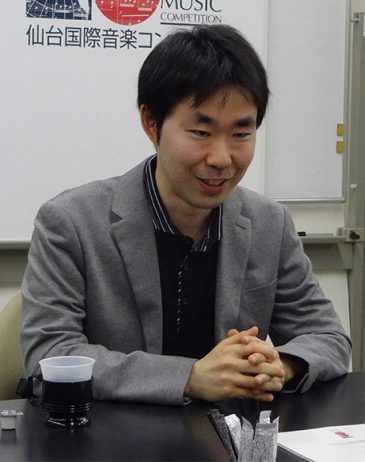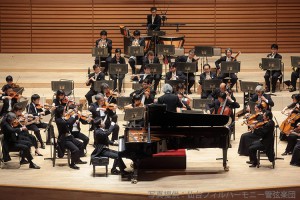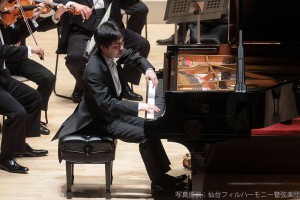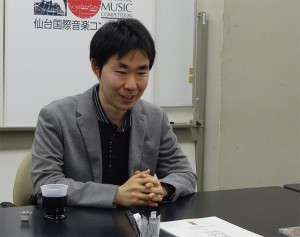Interviews
Interview with Mr. TSUDA Yuya,
1st Prizewinner of the Piano Section at the 3rd SIMC
Interviewed by: SHIMODA Koji (Music Critic, Pianist)
interviewed : 20140530

On May 30, pianist TSUDA Yuya played Beethoven’s Piano Concerto No.3 handsomely in the “Orchestra Standard” concert series with Sendai Philharmonic Orchestra, receiving rapturous applause from the audience. Despite it being the morning following his concert, he showed no sign of fatigue. In a relaxing atmosphere, the interview began.

The audience was so warm and enthusiastic that I felt very happy last night. Since I won the 1st Prize in the Sendai International Music Competition in 2007, I have performed on many occasions in Sendai, including the Sendai Classical Music Festival and Subscription Concerts of Sendai Philharmonic Orchestra. I am grateful to have been given many opportunities to perform in my hometown Sendai, but on the other hand I feel pressure because I have to show my growth each time.
There are many competitions around the world, but there are few that provide such rich performance opportunities after the competition. In most competitions, prizewinners may be invited to perform in some related concerts, but such opportunities are often limited to only until the next prize winners are selected.
I think I’m very lucky. After winning SIMC, my performance opportunities have expanded greatly. Yesterday was the third time for me to play with Maestro IIMORI Taijiro.
“This time, I came back from Berlin two weeks ago. On June 3, I will do an outreach concert with cellist YAMAZAKI Nobuko at an elementary school in Hamamatsu. On June 14, I will perform a recital with violinist KUBOTA Takumi in Niigata, and on June 30, I will give a recital in Mishima in Shizuoka Prefecture.
“In the autumn of 2007, I moved to Berlin to study under professor Pascal DEVOYON for a Konzertsolistin (German national qualification for professional musicians) degree. Since I moved to Germany, I have been able to return to Japan about five times a year for concert performance. In Germany, I was once invited to play a recital by an organizer who had seen the SIMC website. My performance at Sendai International Music Competition, which had taken place in Sendai, Japan, led to an opportunity to play in an unfamiliar town in Germany.
There are not many cases where winners of a major competition go abroad to study after winning. How has the confidence he gained from winning SIMC helped him in his career? Or rather, does he feel pressure for having won the prize?
When I was participating in the 3rd SIMC, I didn’t think I would win. And even after I won, I still did not have much confidence and I was even wondering whether it was a good thing for me to have won the Competition. That’s how my life in Germany has started. Moreover, my performance opportunities have increased suddenly since I won the Competition, so I was a bit confused with the situation. In the meantime, my studies in Germany have started. I feel that time has passed while I was trying to overcome these changes and challenges one by one. I think I was struggling in those days.
In Berlin, various talents gather from all over the world. I get together with some friends once in a while to listen to one another’s performance and give critiques. These opportunities have been very helpful for me. The members who get together are not just piano students, but also students majoring in other instruments and vocal students, so we can comment from different perspectives, for example, ‘A pianist might play like that, but we singers wouldn’t sing like that’ (laugh).

I hear that SIMC is famous at Berlin University of the Arts, as in Japan and elsewhere in the world, and there are many SIMC alumni at the University. So the University has an atmosphere just like an alumni reunion. In Sendai, even Contestants who cannot advance to the next round are given a variety of opportunities to perform. This is one of the reasons that SIMC is well received by Contestants. The warm support of the Secretariat staff and volunteers is also highly praised by many Contestants.
At Berlin University of the Arts, there are students who participated in SIMC in the same year as me, for example, the 2nd Prizewinner LU Yi-Chih from Taiwan, who is a disciple of Professor Klaus HELLWIG, and Esther BIRRINGER from Germany, who was in Professor DEVOYON’s class. One of the reasons that SIMC attracting many participants from Berlin University of the Arts is that SIMC brochures are placed in the University.
“I think it is really nice that many Contestants keep in contact with volunteers. One of the great things about SIMC is that Contestants other than prizewinners are also given various opportunities to perform. I’ve often heard comments from Contestants, saying ‘I was very happy that Secretariat people and volunteers treated me the same way even after I failed in the Competition.’ Unfortunately, the fact is in some competitions, as soon as you fail, you are treated with the attitude of ‘We’re not interested in you anymore.’ However, many say, ‘Sendai is different. They are warm!’ I think that is a great characteristic of SIMC.
After the Competition, Mr. TSUDA has performed outreach concerts in various places other than concert halls.
I have made a number of visits to elementary schools to perform and enjoyed it every time. I was really thrilled especially like when I heard some children say, ‘Wow! I didn’t know this piano could produce such a great sound.’ When I visited an elementary school with Ms. MATSUYAMA Saeka, the 1st Prizewinner of the 2nd SMIC Violin Section, we did some fun activities. We explained to children that a violin bow is made of horsehair, by opening a bundle of horsehair, and held a quiz event in which we asked various questions on instruments such as how many keys are on a piano. But it was winter, and playing the piano in a cold gymnasium was quite hard. Teachers tried to heat the gymnasium by lighting stoves, but the keyboard was so cold. I felt as if I was playing on a keyboard made of ice (laughs). But even still, that was so enjoyable.
Many people look forward to Mr. TSUDA’s future activities.
In Japan, I will perform at the Sendai Classical Music Festival this autumn. In November, I will stage a recital in Tokyo, where I will play Schubert’s Piano Sonata in A major, D.959. Schubert is one of my favorite composers. Beethoven’s piano concertos No. 3, 4 and 5 are already in my repertoire, but I want to play all his concertos including No. 1 and 2. I also want to play concertos by Chopin, Schumann and Brahms. Since I went to Germany, I’ve been studying, paying particular attention to tone quality and depth of sound. I want to incorporate them in my future performance. I’m also interested in teaching.
Mr. Yuya TSUDA achieved great success in Sendai. Please give some advice to people who are planning to participate in SIMC.
This advice is not just for those planning to participate in SIMC. I don’t want Contestants to swing from joy to sorrow based on the results. I think it is important to face music sincerely, believing in the time and efforts you have dedicated to music. If you care about the results too much, forgetting how much you love music, it will distort your attitude toward music itself. “I also think Contestants should consider the competition as an opportunity to play. What I think is great about SIMC is that it allows Contestants to play a concerto from the Semifinal Round. To tell the truth, I participated in the 2nd SIMC as well. Although I lost in the Semifinal Round at that time, my experience of performing Ravel’s Concerto there was so nice, it made me want to participate again in the 3rd Competition.
SIMC has quite a few repeaters. I think that is because, in addition to great support of the Secretariat and volunteers, Contestants can play a concerto from the Semifinal Round. Also, there is a large audience from the Elimination Round onward. I think that you can feel the joy of having an audience listen to your performance while you feel nervous.

It seems that Mr. TSUDA loves Sendai very much. There are many fans waiting for him in Sendai.
Sendai is called ‘the City of Trees.’ I think the most fascinating aspect of Sendai is its beautiful nature. Also, the food is great, especially the rice and sake. I was born and brought up in Sendai, so I take great pride in them (laughs). Sendai has a nice mix of urban and rural elements.
I will take on new challenges and work hard to hone my skills so that I can present every time to the audience coming to my concerts how much progress I am making.


